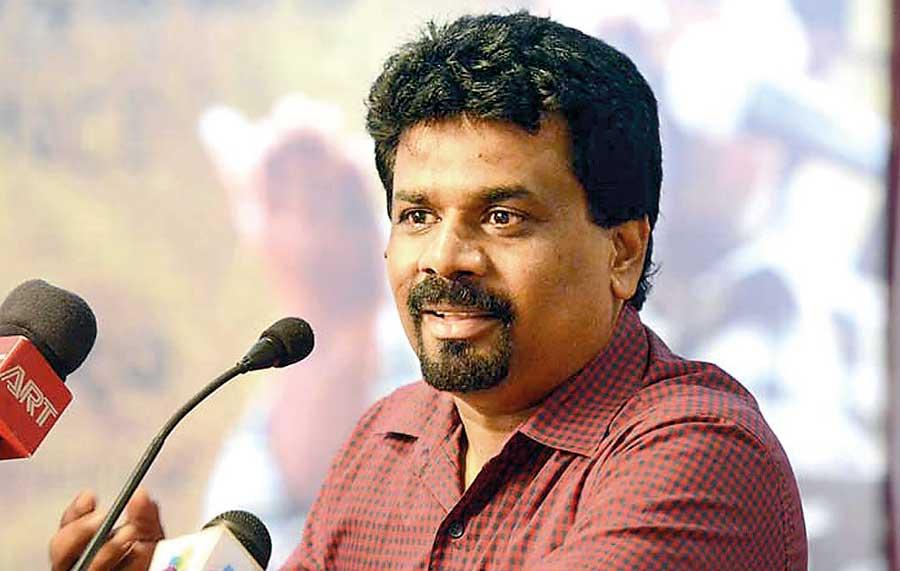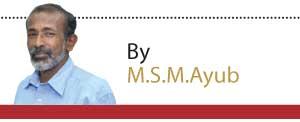01 Sep 2023 - {{hitsCtrl.values.hits}}

Leader of NPP as well as the JVP, Anura Kumara Dissanayake had told at a TV political programme recently that he has been chosen as the candidate of the National People’s Power (NPP) by its Executive Council for the next presidential elections
Despite the law not permitting the Election Commission to hold the next Presidential election before October next year, the National People’s Power (NPP), the political movement led by JanathaVimukthi Peramuna (JVP) has announced its Presidential candidate.
JanathaVimukthi Peramuna (JVP) has announced its Presidential candidate.
Member of Parliament and leader of the NPP as well as the JVP, Anura Kumara Dissanayake had told at a TV political programme on Monday that he has been chosen as the candidate of the National People’s Power (NPP) by its Executive Council.
Two factors might have prompted the JVP/NPP to announce its Presidential candidate at this juncture. One is the speculations among the Opposition parties that President Ranil Wickremesinghe is planning to bring in an Amendment to the Constitution enabling him to conduct the next Presidential election before the period specified by the Constitution.
In spite of a President elected by the people having the right to seek a second mandate after the completion of four years of his tenure, the Constitution, not leaving any room for doubts, states that a succeeding President - a President who has been appointed by the Parliament for a vacancy created by the death or resignation of another President - does not have that right. Hence, Wickremesinghe, if he abides by the Constitution, cannot hold the next Presidential election before October next year. It is against this background speculation doing their rounds that President Wickremesinghe was planning to amend the Constitution allowing him to go for an early election.
Recent opinion polls by various independent groups indicated that the JVP/NPP is far ahead of all other parties, notwithstanding it not faring enough to win alone
Secondly, the NPP has taken this decision at a time when the Opposition parties and groups are contemplating taking collective actions to safeguard democracy in the country in the face of the government led by President Ranil Wickremesinghe refusing to hold local government and provincial council elections and all kind of dissent being crushed.
The local government elections that were scheduled to be held February last year have again been postponed indefinitely after being rescheduled for March 9 this year, as the government refused to release funds that were allocated for them by the last budget. The government is withholding those funds using executive powers, despite a Supreme Court order on March 3 against the Finance Ministry not to do so. Further, the government attempted to summon the Supreme Court judges who gave this order before the Parliamentary Committee on Ethics and Privileges.
Meanwhile, following the brutal crackdown on the last year’s Aragalaya, a similar suppression on dissidence is carried out by the police on almost every protest, even by single individuals, while the prices and tariffs are going through the roof, patients are dying of suspected substandard medicines and corruption has engulfed every aspect of life unabated. It is against this backdrop that cry for democracy reaching new heights.
The collective actions by the Opposition parties against the suppression might be viewed as a prelude to fielding a common Opposition candidate for the Presidential election or such a demand might arise from among the Opposition ranks. This would, most probably sink the chances of JVP leader to contest at a time the party seems to be at the highest position in terms of popularity in its history. Recent opinion polls by various independent groups indicated that the JVP/NPP is far ahead of all other parties, notwithstanding it not faring enough to win alone.
The JVP, in fact is in a fix in working against the government with other Opposition parties and groups. The JVP/NPP has already been accused by various anti-government groups for not joining hands with them in their protests against the government. They are also accused of having overestimated their power base which has prevented them from joining others. However, on the other hand they are also accused of having dealings with corrupt or opportunistic groups.
The JVP, in fact is in a fix in working against the government with other Opposition parties and groups
Social media carried such posts when a delegation the Nidhahasa Janatha Sabhawa led by former Minister Dullas Alahapperuma visited the JVP headquarters in Pelawatta to discuss the possibilities of taking joint action against government’s moves against democracy. The argument in social media was that Alahapperuma and his group was a part of and sometimes in the forefront of the Mahinda Rajapaksa administration which was highly corrupt and tyrannical.
However, the leftist theory followed by the JVP permits them to make varied decisions in respect of joint action against dictatorial measures by the government and electoral alliances. Immediate actions and electoral alliances were described by the party during its founder Rohana Wijeweera as united action and united fronts, respectively. Marxists say “march separately, strike together.”
Apart from the new hopes of electoral successes instilled lately in the minds of the JVP/NPP leaders, given the outcomes of its collaborative electoral history, the party seems to be hesitant to support or collaborate with any other party in elections. When the United National Front Government agreed to discussed the Interim Self-Governing Authority (ISGA) - a near blueprint for a separate state - presented by the Liberation Tigers of Tamil Eelam (LTTE) in 2003, the JVP signed an electoral pact with the Sri Lanka Freedom Party (SLFP) creating the United Peoples Freedom Alliance (UPFA) and successfully persuaded President Chandrika Kumaratunga to topple the UNF government, first by taking over three key ministries and later by dissolving the Parliament in 2004.
They won 41 seats in Parliament under the UPFA at the 2004 General election and held ministerial portfolios as well. However, they withdrew from the government again in 2005 when Kumaratunge also gave in to the pressure by the LTTE to sign the agreement on Post-Tsunami Operational Management Structure (P-TOMS) orcommonly known as Joint Mechanism. This mechanism was also presented by the LTTE ostensibly to provide relief to victims of 2004 tsunami, bringing the areas held by the government as well under its control. Yet, the party supported Mahinda Rajapaksa, the UPFA candidate at the 2005 Presidential election, for the sole reason of preventing Ranil wickremesinghe from taking over the reins again, in the context of the ceasefire agreement he signed with the LTTE was still in force. However, in the process they painted a rosy picture of the government under Mahinda Rajapaksa, and the videos of their speeches circulated in social media are still haunting them.
By 2010 the immediate concerns of the JVP had changed from separatism to mass-scale corruption by the Mahinda Rajapaksa regime, pushing them to support Opposition’s common candidate Sarath Fonseka at the Presidential election held in the same year, ignoring that fact that Fonseka’s main support base was in fact that of the UNP. They again supported another common Opposition Presidential candidate, Maithripala Sirisena in 2015 for the very same reason, as it was clear that they cannot turn the tide of a corrupt and despotic regime, on their own. In all these instances, the JVP had to push its cause - socialism through their own government - to the back burner for both their incapability and immediate concerns.
Despite them being clear about their immediate concerns and the ultimate political cause during all these political maneuverings, people and other political parties did not view any difference between them. Hence, now the party is facing the difficult task of justifying their alternate support to various political parties and leaders in the past. Recently, the Samagi Jana Balawegaya (SJB) accused the JVP for bringing in the corrupt Mahinda Rajapaksa government in 2005. Nevertheless the SJB leaders seem to have forgotten that the JVP had supported them as well to come to power in 2015.
There have been instances where the JVP had contested elections on its own, knowing very well of their humiliating defeats. This commitment has always been justified by the leftist contention that elections pave the way for them to educate the people even if they fail. However, the JVP/NPP seems to be not so pessimistic this time.
27 Dec 2024 4 hours ago
27 Dec 2024 4 hours ago
27 Dec 2024 6 hours ago
27 Dec 2024 6 hours ago
27 Dec 2024 6 hours ago